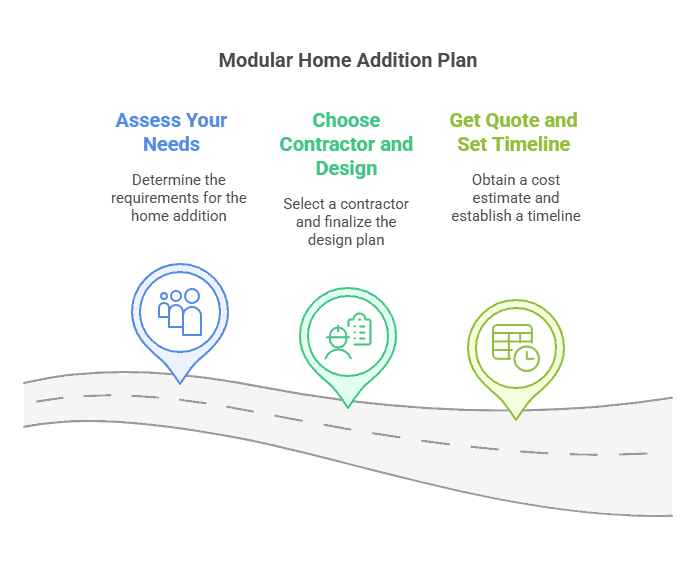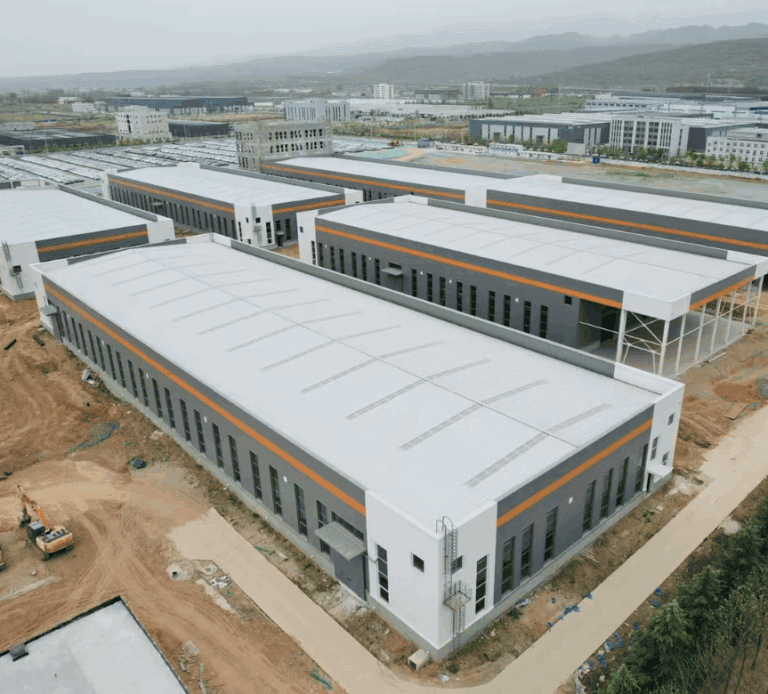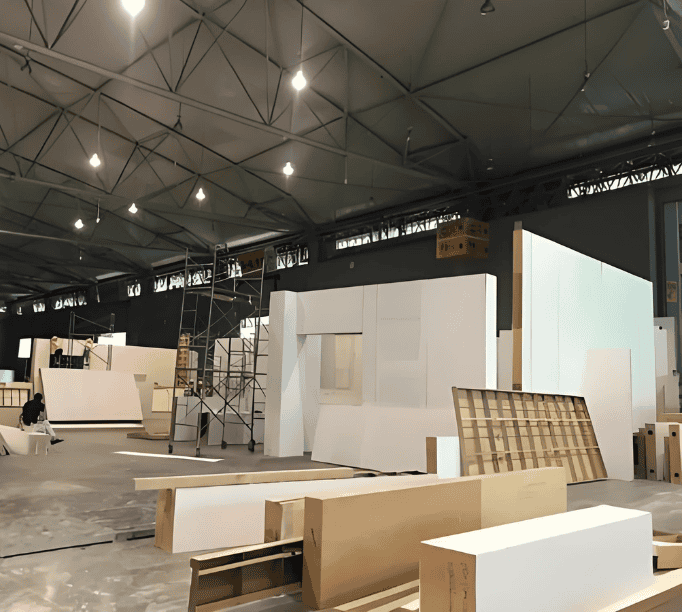Modular home additions offer homeowners and investors a faster, smarter, and more cost-effective way to expand living or rental space without major disruption. In 2025, these factory-built extensions are redefining how people improve their homes — combining precision, sustainability, and flexibility that traditional builds can’t match.
In this guide, you’ll learn what modular home additions are, how they save cost and construction time, and why they’ve become so appealing to modern homeowners. We’ll also explore their advantages for real-estate investors, from property value growth to rental ROI, the different types of modular additions available, and how to plan your project step-by-step for success.
Backed by over a decade of engineering experience, SteelPRO PEB — an ISO- and CE-certified steel structures manufacturer with 24 automated production lines — ensures every modular addition is produced under factory-controlled standards for quality, safety, and performance.
Whether you’re expanding a family home or developing an investment property, this guide provides the insight and expertise you need to build smarter with confidence.
What is Modular Home Addition?
A modular home addition is a construction method where pre-built modules are used to expand an existing home. In brief, sections of the structure are manufactured in a factory and subsequently delivered to your site for swift assembly. Modular home additions present numerous benefits over traditional ones.
Cost and Time Efficiency of Modular Home Additions
Cost Advantages
Modular home additions are more cost-effective than traditional construction, particularly for those with limited budgets. Traditional additions entail substantial labor and on-site work, often resulting in unforeseen expenses and budget exceedances. In contrast, modular additions are largely built in a factory, reducing on-site complexity and labor needs, resulting in lower overall costs.
Modular additions save in several areas. First, the materials are used efficiently, as modules are pre-built in a factory, reducing waste. Second, factory production is standardized and precise, minimizing errors and extra costs. Furthermore, the streamlined process of factory manufacturing and transportation minimizes the on-site construction duration, thereby decreasing labor expenses.
As a factory-based producer, SteelPRO PEB minimizes on-site disruption and ensures controlled cost management — clients typically save 20–30% in total project costs compared to traditional home extensions.
Construction Time
Modular additions significantly reduce construction time, often completing projects much faster than traditional methods. Since most of the work is done in a factory, only quick assembly is needed on-site, minimizing disruptions like noise and dust.
For projects where time is a crucial factor, such as real estate investments, modular additions are the perfect choice. They can be completed in weeks, while traditional construction might take months.
Overall, modular home additions provide controlled cost savings and faster construction, making them an efficient and cost-effective solution for home expansions and real estate investments.
The Appeal of Modular Home Additions for Homeowners
Increasing Living Space
Modular additions provide an excellent way to expand your home by adding more functional space. For example, you can easily add extra bedrooms for a growing family, create a home office for remote work, or expand your living area to accommodate larger gatherings. The flexibility of modular construction allows you to choose exactly how and where you want to increase space to suit your needs.
Modular room additions or prefab extensions to existing homes are among the most popular homeowner choices — providing flexible, ready-to-install space expansion without major construction disruption.
Custom Design
One of the major benefits of modular home additions is the ability to customize. Whether you want a specific layout, style, or functionality, modular additions can be tailored to your exact preferences. You can choose everything from the size and shape of the room to its finishes, ensuring that the new space blends seamlessly with the existing home and meets your family’s unique needs.
Sustainability and Eco-Friendliness
Modular home additions are often more sustainable and eco-friendly than traditional construction. They generally adhere to green building standards through the use of energy-efficient materials and construction methods that substantially decrease waste. Many modular builders also prioritize using environmentally friendly materials, such as sustainable wood and recycled products, making it a great choice for homeowners looking to reduce their environmental impact.
Advantages of Modular Additions for Real Estate Investors
Increasing Property Value
For real estate investors, modular additions offer a way to quickly enhance a property’s value. By adding more square footage or functional rooms, such as additional bedrooms or a rental unit, modular additions make the property more appealing to potential buyers. This can significantly boost the market value, making the investment more lucrative when it’s time to sell.
Impact on the Rental Market
Modular additions are particularly beneficial for investors in the rental market. By adding extra space, whether it’s an additional bedroom or a separate unit, you can increase the rental value of your property. More space often leads to higher rent, thereby making the property more attractive to potential tenants. Consequently, this enables you to optimize your return on investment through greater rental income.
Return on Investment
By utilizing a modular addition to expand a property, investors can boost their overall return on investment. The additional space can result in higher rental income and an elevated resale value, making it a lucrative investment. The relatively lower cost and quick construction timeline of modular additions mean that investors can see faster returns compared to traditional construction, helping them maximize their profits.
For investors targeting multi-family or rental developments, SteelPRO PEB’s modular units enable scalable additions — from single add-on rooms to complete prefab apartment wings — shortening return cycles and boosting rental income efficiency.
Types of Modular Home Additions: Choose the Right Expansion for Your Needs
Modular home additions offer a wide variety of options for homeowners and investors looking to expand their properties. Here are some common types of modular additions that cater to various needs:
- Extra Bedrooms: Adding extra bedrooms is a popular choice for growing families. It provides more space for family members or guests, enhancing comfort and convenience.
- Home Offices: With the increasing prevalence of remote work, many homeowners are opting to add home offices. A dedicated space for work can improve productivity and offer better work-life balance.
- Sunrooms: Sunrooms are a great way to add natural light and a relaxed atmosphere to your home. They can serve as extra living areas or simply as spots to revel in the outdoors from the indoors.
- Storage Space: Including a storage room or closet can aid in decluttering your home and enhancing its organization. This is particularly beneficial for homeowners who have limited storage options.
Modular additions can be tailored to suit a wide range of needs, whether you require extra living space, workspaces, or specialized rooms. By choosing the right type of addition, you can ensure that your expansion fits your lifestyle and enhances your property’s value.
SteelPRO PEB provides a full modular catalog, including prefab bedrooms, expandable home offices, and modular living extensions — all engineered and fabricated in our 500-acre production base to ISO and CE standards.

How to Get Started: Your Modular Home Addition Plan
Step 1: Assess Your Needs
The initial step in planning a modular addition involves identifying the type of space you require. Consider your lifestyle, the current arrangement of your home, and your upcoming requirements. Are you in need of an additional bedroom for an expanding family? Should you add a home office for remote work? Or maybe a sunroom to enjoy natural light? Clearly defining the type of space you need will help you make informed decisions about the design and layout of your addition.
Step 2: Choose the Right Contractor and Design Plan
After pinpointing your needs, it’s time to locate a modular addition company suitable for your project. Look for a contractor who specializes in modular construction and has a proven track record for delivering quality work. Request to view previous projects or reviews to ascertain their capability to fulfill your requirements.
Collaborate closely with the company to tailor a design that matches your space demands, stylistic preferences, and budget. A proficient contractor will assist you in exploring design options, materials, and ensuring your vision aligns with your objectives.
Step 3: Get a Quote and Set a Timeline
After finalizing the design, request a detailed quote from your chosen contractor. This will facilitate your understanding of the cost breakdown, encompassing materials, labor, permits, and any additional charges. Once you receive the quotation, collaborate with the contractor to establish a transparent timeline for the project.
Make sure to set realistic expectations for both budget and construction time, ensuring your addition is completed within your desired timeframe. Keep communication open with your contractor to ensure that everything stays on track.
Starting your modular home addition project with a clear plan and the right team will help you stay organized and avoid delays. By adhering to these steps, you can guarantee a seamless and effective expansion that boosts your home’s value and functionality.
Once your plan is ready, contact SteelPRO PEB’s modular design team for a free factory-based quotation and technical consultation.
Do you need a permit for a modular home addition?
When contemplating a modular home extension, it is vital to grasp the necessary permits and local regulations that could be applicable. Here’s an overview of key considerations to be aware of:
- Permit Necessities: In various regions, modular additions necessitate specific permits prior to the commencement of construction. These permits guarantee that the addition complies with safety and building code regulations. It’s vital to consult with your local authorities to determine which permits are mandatory for your particular project.
- Regional Building Regulations: Building codes vary by location and are designed to ensure that construction meets local safety and compliance benchmarks.Depending on where you live, you may need to adhere to specific guidelines regarding the materials used, the structural integrity of the addition, and its impact on the overall property.
- Approval Processes: Different regions may have different approval processes. Some areas require detailed plans or inspections before allowing a modular addition, while others may have a faster, more streamlined process. Be sure to research the local building regulations to understand the approval process in your area.
Understanding the legal requirements and permits needed for your modular addition project will help ensure that the construction goes smoothly and is fully compliant with local laws. Always consult with your local government or a professional contractor to make sure your addition is up to code.
Key Considerations for a Smooth Modular Home Addition
When organizing a modular home addition, several crucial aspects should be taken into account to guarantee a seamless project progression:
1. Construction Noise and Pollution
While modular additions generally produce less noise and pollution than traditional methods, some noise will occur during module transportation and on-site assembly. To minimize disruption, coordinate with your contractor to schedule work during quieter hours, avoiding peak times.
2. Integration with the Existing Home
Ensure that the modular addition integrates seamlessly with your existing home in terms of design, layout, and structure. If your home has a unique style or specific structural needs, work with an experienced designer and contractor to ensure a perfect match.
3. Suitability of the Home Structure
Not all homes are suitable for modular additions, especially older or complex structures. A professional structural assessment is essential to determine if your home can support the planned extension.
4. Permits and Regulatory Requirements
Permits are required for modular home additions, and compliance with local building codes is mandatory. Prior to initiating the project, it is essential to consult with local authorities to secure the necessary approvals and permits.
5. Time Management
Modular additions are faster than traditional construction, but effective time management is still crucial. Set a clear timeline with your contractor, and stay in communication to address any unexpected delays.
By tackling these considerations at the outset, you can guarantee a smooth and efficient modular addition that harmonizes seamlessly with your existing home while enhancing its value.
How much does a modular addition cost?
Costs typically range from $100–$300 per square foot, depending on materials, size, and customization. Factory production by SteelPRO PEB ensures consistent pricing, minimized waste, and stable cost control compared to traditional on-site construction.
How long does a modular addition last?
Modular extensions are built to the same standards as traditional homes, ensuring they are durable and long-lasting. With proper maintenance, they can last for 50 years or more.
SteelPRO PEB — Building the Future of Modular Home Additions
As homeowners and investors seek smarter, faster, and more sustainable ways to expand existing properties, modular home additions have become the go-to solution for 2025 — offering efficiency, adaptability, and long-term value.
SteelPRO PEB supports this transformation as a global manufacturer specializing in factory-built modular home additions. With 24 automated production lines and over 1,000 projects completed across residential and commercial sectors, we deliver engineered prefab extensions that integrate seamlessly with existing homes.
Every addition — whether a prefab bedroom, expandable home office, or modular living unit — is designed, fabricated, and quality-assured in our 500-acre smart factory, ensuring precision, sustainability, and cost control. Homeowners seeking long-term flexibility can also explore our expandable modular house solution — a future-ready system that adapts as your needs grow.
By combining factory-standard engineering with on-site installation efficiency, SteelPRO PEB helps homeowners achieve their expansion goals without the delays and uncertainties of traditional builds.
Start your home expansion journey today — contact our modular design experts to get a factory-direct quote and discover how modular additions can redefine the way you live and grow.

